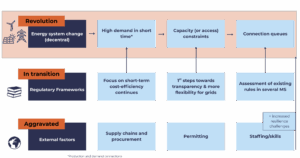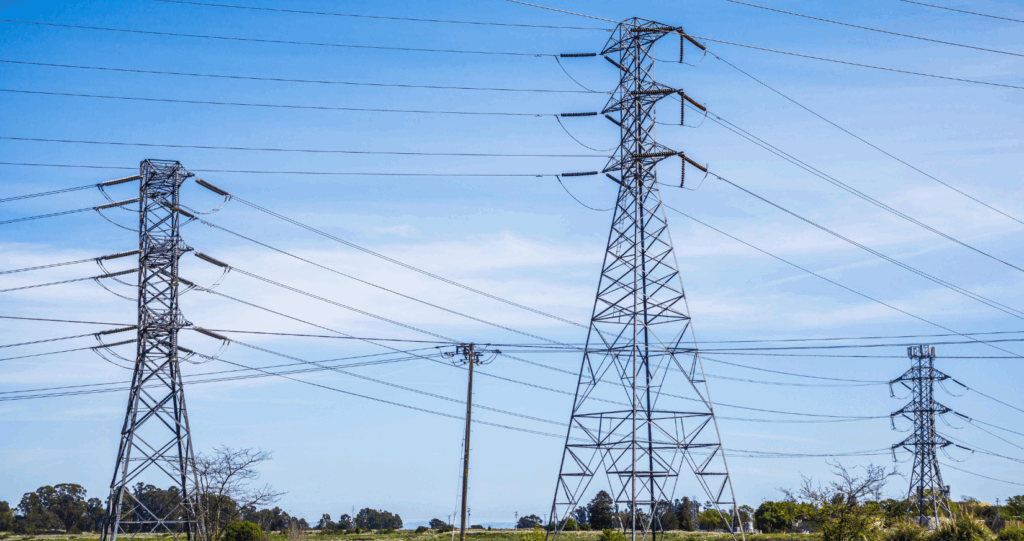On 25 July 2025, DSO Entity responded to the European Commission’s (EC) Public Consultation on Grid Connection, for which non-binding Guidelines are expected in Q4 2025. DSO Entity’s response shows the increasing challenge for DSOs to deal with a significant growth in connection requests in a very short period.
While several measures and good practices are provided in the response, DSO Entity stressed that not only the symptoms but also the cause of the problem should be treated. It highlighted that the right investment climate and forward-looking regulatory frameworks with an anticipatory investment approach are key to alleviating the problem in the mid- and long-term as well as the tackling of external factors (e.g., protracted permitting procedures, access to supply chains, raw materials, and a skilled workforce).

How can the growing challenge of speculative and immature applications be tackled?
Speculative and immature applications that lead to delayed and stalled projects (virtual grid saturation) are an increasing challenge for DSOs: “Virtual” projects block available capacity for other projects and increase uncertainty in DSO planning. To improve the situation, the introduction of stricter eligibility criteria is needed, and potential concrete measures include: (1) requirements of financial guarantees at the application stage, (2) binding project development milestones, and (3) prioritization of ready-to-build projects that demonstrate a high degree of maturity.
Is the “first-come, first-served” approach to dealing with connection requests still suitable?
It currently applied ‘first-come, first-served’ approach seems to be no longer the most efficient way to manage grid connection requests. Yet DSOs are neutral market facilitators, and thus any possible preference criteria need to be a decision taken by national governments and competent authorities after a consultation process involving grid operators. Any preference criteria should be easy to apply and without contradiction while keeping a certain flexibility to set a fair and transparent framework.
When/why is there a need to submit a new connection request for existing projects?
In general, the submission of a new connection request is important in case of an increase of contracted capacity or other (technical) changes since this affects the basis of the connection, and the re-application ensures that DSOs can model the customer’s effect on the network correctly. While DSOs adhere to the principles of equal treatment and non-discrimination when treating connection requests, different approaches with limited derogations could be considered for very small generation devices or large requests for demand connection (e.g. data centers).
Which measures can help to tackle the lack of available grid capacity?
Potential measures to tackle lacking grid capacity include the following: (1) Flexible connection agreements, (2) milestone-based advancement, (3) co-location/hybrid plants, (4) enhanced coordination between TSOs and DSOs, (5) geographically dependent connection fees and/or locational signals to incentivize projects in areas with available capacity, (6) auctions, (7) establishment of a specific framework for very large demand connection requests (e.g. data centers), (8) application windows, (9) other measures such as raising awareness, supporting new technologies and the use of smart energy management, usage of implicit and explicit flexibility.
Substantial progress has been made under the current EU legal framework on the topic of grid hosting capacity, through the work by DSO Entity and ENTSO-E and the efforts of Member States. The existing flexibility within the framework enables system operators to adapt to specific local conditions while using network calculating methodologies and tools that best match their network characteristics and possibilities. Due to the highly dynamic and context-dependent nature of hosting capacity calculations and data, imposing top-down rules on how to calculate and present this information could lead to inefficiencies, unnecessary administrative burdens, and a loss of room for innovation.
DSO Entity’s response to the consultation, including several good practices from Member States, is available here.
For more information please contact: Elisa.VanDooren@eudsoentity.eu


